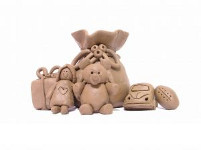Boxing Day Secrets
 It’s the day after Christmas, and I’m working in the living room this morning, happily surrounded by my new books and the noise of our younger children playing. But there’s the question: What are we going to do about all the new toys in the house? Here are some startling truths we’ve discovered in 23 years of parenting:
It’s the day after Christmas, and I’m working in the living room this morning, happily surrounded by my new books and the noise of our younger children playing. But there’s the question: What are we going to do about all the new toys in the house? Here are some startling truths we’ve discovered in 23 years of parenting:
1. It’s okay not to replace batteries.
As a child I wished for some of the automated toys I saw in the Sears catalog, but as an adult I’ve been able to admit they often don’t live up to their marketing. Sometimes there’s more play value in the unpowered, silent toy, when the child’s imagination fills in the action and dialog. We have a few toys which were enjoyed for years, by multiple children, after their first and only set of batteries ran out.
2. It’s okay to relocate some toys.
Our children have a game system, a gift from a well-to-do relative, which stays at a grandparent’s house. That makes it fun for a visit, but keeps it from becoming a tyrant in our home life. Moving some particular toys to another place can declutter a bit at home, and it gives some options to entertain the children when Grandma’s tired or out of ideas. You can do this with duplicated items, things which tend to distract your children from their normal routines, or things which might not work well in your own home (toys which need lots of outdoor space, like Grandma and Grandpa’s yard, and can’t be enjoyed in your townhouse courtyard).
3. It’s okay to create some rules.
With six boys, we’ve accumulated a lot of construction toys. A LOT. THOUSANDS of LEGO bricks. MULTIPLE thousands. This is not a bad thing, maybe, but because we don’t have acres of space inside, we’ve had to put a rule in place: “No Monuments.” We are delighted when our sons build elaborate models of cities, airports, ships, and all, and cover table tops or their bedroom floors with gigantic constructions. However, we do require that they put them away after a few days — we don’t have the space to house these things indefinitely, so our sons understand that their creations are temporary models to enjoy, not everlasting monuments. A few creative guidelines or regulations can keep everybody happy for the long run.
4. It’s okay to control or even put away some toys.
You might look at some gifts and say, “Wow, that’s an evil-looking toy,” and decide there’s a moral imperative to take it out of your family’s life. But there are other reasons which are valid, too. Have you ever seen the popular toddler toy known as a “popper”? Or toys which have a microphone and a speaker … who in the world ever thought it was a good idea to give a small boy an amplifier? As the parents in our families, we have to manage our homes for the peace and productivity of our whole family. It’s okay to decide that a toy is too noisy, or promotes too much boisterousness, or seems to encourage bad feelings between siblings, and therefore needs to be limited in some way.
Occasionally we’ve gone through the toy bins and picked out the irreparably broken bits, the outgrown and unloved and such, and quietly ushered them out of our homes. It’s a good time to gather the parts which have become separated from their sets, too. It works best to do it when the younger kids aren’t home. I call it “A Visit From Anti-Claus.”
We always try to keep in mind that our kid’s toys are their tools for learning, and some of them are keepsakes — a special gift from a friend or relative, or a favorite thing from their earlier childhood. We aren’t harsh or unsympathetic to our young children’s wishes; a worn out toy may be worn because it’s loved, not undesireable because it’s worn. But it’s good to remember that God put us in charge of our children and their home, including the things and activities we allow, and sometimes in our child-centered and consumer-driven culture we need encouragement to be the Dad or Mom our kids need. It’s okay — give yourself permission.
—————————————————
When our first son was 9 years old, we thought we were failing as parents. Something was changing, and we couldn’t figure out what was happening or how to help him — or ourselves! — make it through. Nobody told us what to expect, and we didn’t even know how to ask.
Here’s help!: Check out our Boot Camp 9-12, for parents of boys in the pre-teen years. This five-session webinar series will discuss all kinds of things which may be putting stress in your relationship with your son, things which may be driving both of you a little crazy. It’s live, interactive, encouraging, and fun, too. CLICK HERE TO FIND OUT MORE!